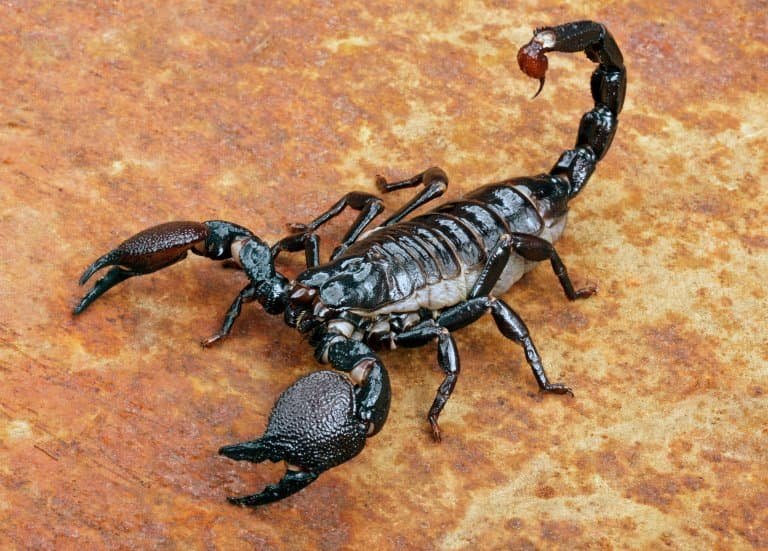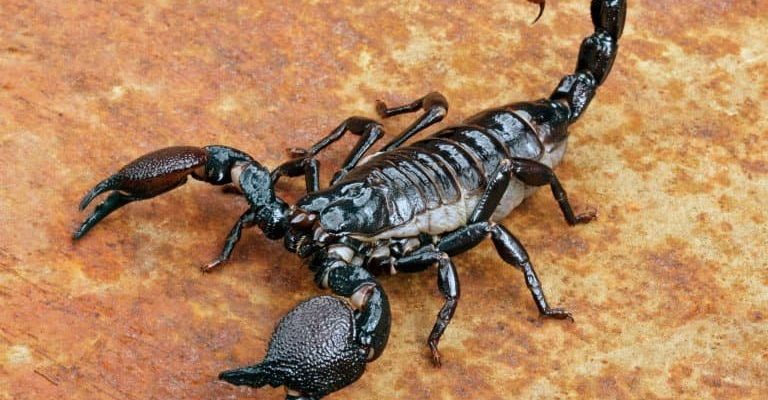
These scorpions are more than just intriguing to look at; they have a lot of interesting traits that make them unique in the animal kingdom. From their impressive size to their social behaviors, there’s much to discover. So, whether you’re a budding entomologist or just someone looking for fun facts for your next trivia night, let’s dig into the world of the Emperor Scorpion!
What Makes an Emperor Scorpion Unique?
The *Emperor Scorpion* (*Pandinus imperator*) is one of the largest scorpion species, reaching lengths up to 8 inches. Imagine holding a creature that could fit in your palm but is armored like a small tank! These scorpions are primarily found in the rainforests of West Africa, where they thrive in dark, humid environments. They thrive under the cover of leaves or rocks, making it difficult for predators to spot them.
What really sets the Emperor Scorpion apart is its vibrant coloration. They typically have a glossy, black exoskeleton that can look almost armor-like. But here’s the twist: under ultraviolet light, they glow a bright blue-green! This feature is thought to help them communicate with others of their kind or perhaps to deter predators. It’s like having a hidden superpower that makes them even more fascinating.
Habitat and Lifestyle
Emperor Scorpions prefer living in tropical climates, often making their homes in burrows underground. These burrows are their safe havens, keeping them protected from the elements and other animals. They are nocturnal creatures, meaning they come alive at night. So, if you’re looking to catch one in action, don’t expect to see them during the day.
These scorpions are also fascinating because they exhibit social behaviors rarely seen in other scorpion species. They can live in groups, especially during mating season, which is a bit unusual for something that sounds so intimidating. Imagine a group of these critters huddled together, like a family in a cozy den. They communicate with each other through scents and body language, showing that there’s more to them than just a fierce appearance.
Feeding Habits
Now, let’s talk about what Emperor Scorpions eat. They’re primarily carnivorous, enjoying a diet of insects like crickets and roaches. Think of them as little predators in the wild, using those large pincers to catch their dinner. They are not only skilled hunters but also very patient ones. They can wait for hours, camouflaged among the leaves, waiting for the perfect moment to strike.
Here’s the thing: they don’t just hunt for themselves; they also play a role in controlling the insect population. This makes them valuable contributors to their ecosystem. However, if they find themselves in captivity, they can be fed a balanced diet of insects, keeping them healthy and happy. Keeping an Emperor Scorpion as a pet can be a rewarding experience, but it does come with responsibilities.
Venom and Defense Mechanisms
One common misconception about scorpions is that they are all lethal. While the Emperor Scorpion does possess venom, it’s not particularly dangerous to humans. In fact, its sting is often likened to a bee sting—painful but not life-threatening for most people. This fact might help ease the minds of those who are a bit squeamish about these creatures.
Despite this, the venom serves a crucial purpose. It helps the scorpion immobilize its prey quickly, allowing for easy consumption. When threatened, Emperor Scorpions might raise their pincers and tail as a warning, showcasing their impressive size. This display can be quite intimidating. It’s like watching a tiny gladiator preparing for a contest—an impressive sight, indeed!
Reproduction and Lifespan
Reproducing is a fascinating aspect of the Emperor Scorpion’s life cycle. They engage in a courtship dance that can last several hours. During this time, the male and female will hold onto each other’s pincers and move in circles. It’s almost like a little dance party in the middle of the jungle!
After mating, the female gives birth to live young, which is quite unique among arachnids. The babies will climb onto their mother’s back immediately after birth, riding along until they can fend for themselves. This maternal care is another reason why these scorpions are so interesting. They can live up to 8 years in captivity, allowing plenty of time to study their behaviors and habits.
Keeping Emperor Scorpions as Pets
For those interested in having an Emperor Scorpion as a pet, there are a few considerations. First off, they require a well-maintained habitat that mimics their natural environment. This includes proper humidity levels, temperature control, and hiding spots. You wouldn’t want to live in a dull space, right?
Feeding them is crucial too. A diet of crickets and other insects, supplemented with calcium, is key to keeping them healthy. It’s also important to handle them with care, ensuring that they feel secure and not threatened. Most of the time, they’re friendly creatures, but they might give you a little pinch if they feel scared!
Myths and Misunderstandings
Lastly, there are plenty of myths surrounding Emperor Scorpions that are worth debunking. For instance, many people believe that scorpions are aggressive and always out to sting. In reality, they are more likely to avoid confrontation. Their main instinct is survival, not aggression.
Some folks also think that they glow in the dark; while they do glow under UV light, they won’t light up your room at night. Understanding the true nature of these creatures can lead to a greater appreciation for them, whether in the wild or in your home.
In conclusion, the Emperor Scorpion is a remarkable creature with a blend of beauty, intrigue, and a bit of mystery. From its glowing exoskeleton to its unique social behaviors, there’s a lot to admire about this little tank of the animal kingdom. Whether you’re thinking of keeping one as a pet, studying it, or simply marveling at its existence, the Emperor Scorpion is sure to capture your imagination.

